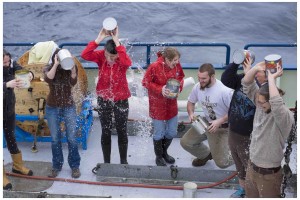The internet connection on the R/V Knorr is tenable, but slow.
When I sit down at the computer, I often bring reading material to look at while web pages load. Streaming videos and downloading music is out of the question. I’ve now “watched” two awards shows, one presidential address, and multiple music videos exclusively through the lens of what people were saying about those things on Twitter and in think pieces. The song of summer — the lyrics most blasted from cars and in coffee shops and in clubs — is irrelevant here. Several among us (not me) boast that they haven’t checked Facebook since we set sail.
Still, we’re connected to the outside world. Notably, we’ve kept track of the Bardarbunga volcano in Iceland as its activity made its way to a “yellow” warning level, then up to “red.” We’re headed to Reykjavik, where we’ll dock and fly home, so if it really goes off it could, hypothetically, affect our travel plans. Each piece of Bardarbunga news, in the absence of iPhones, and instant updates, is dispensed like gossip. On the whole, the impending eruption serves as a Rorschach test. Some of us (me) look up the effects of ash on airplane engines, and make nervous jokes about how “oh well we can always leave Iceland on a boat.” Others express hope that the eruption holds off until we are back on land, and they can travel closer to it.
The ALS “ice bucket challenge” became a thing right about the time that we left Iceland. Since the meme lives in video form, most of what I know comes from reading news articles: people dump buckets of ice on their head, and/or donate money to ALS research.
The crew got the idea to do it on board. There’s one obvious modification: instead of using precious fresh water — which is produced on board via energy-intensive reverse osmosis — we used water straight from the North Atlantic. There is a hose on deck that conveniently dispenses salt water, at a cool 40 degrees. No one had actually seen an ice bucket challenge video, of course. But I think we figured out the gist of it alright.
What on Earth else do we do for fun without the internet?
The Knorr has a collection of movies, a Scrabble set (surprisingly, tiles do not slide around even when the boat is rocking), a cribbage board, a library. From some angles, the stock of media available is a time-capsule: there are plenty of magazines, issue of Shape, Cosmopolitan, Harpers and others spanning the past two years. We talk about past episodes of Radio Lab, the archives of This American Life; our collective conscious of podcasts halts at August 5th.
We make popcorn and hot chocolate; both seem to be available in an endless supply. There is a gym where I, diligently but maybe futilely, attempt to train for the half-marathon I am planning on running in the fall. Though I have yet to see a whale, many Knorr-passengers have successfully spotted whales. (There are always lots of seagulls.)
At night, when it’s not cloudy, you can see the stars. On occasion I’m woken up around 2 am — not by the buzz of my iPhone, but by someone knocking on our cabin door announcing that the Northern lights are visible.
In the absence of a smart phones (well, we have them, but they stay stowed in our cabins), one of the deck hands keeps what he calls “quarter notes.” He has a piece of paper, folded into fourths, where he makes lists: things he is going to Google when he sits down at his laptop, places he’s going to go when he’s on his six day break before heading back to sea.
One of the most startling things about living on a boat, temporarily, is that boat life is life. For many, it is a large chunk of their year: The crew go through cycles of months on and weeks off. But even for the scientists, who spend the majority of their year on land, being at sea is a routine thing — at least, in the simple act of going to sea, if not the day to day nuances and challenges. Several of the scientists report that it was a life time of sailing, or interest in boats, or joy of cruises, that brought them to study oceanography. The ocean is not an abstract thing to study, somewhere far away. It is here, it is big, it becomes a home.
One crew member, newly graduated from college and switching ships every few months, notes that it can be hard to make friends. People come and go; he comes and goes. But we’re all here together now, in a temporary Knorr-community.
We extend our lunch conversations long past dessert. And for once, no ones checking their phones.

One response to “Life in Knorr-world”